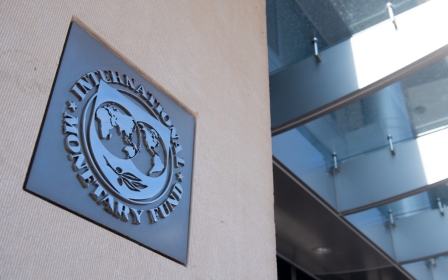IMF urged to delay $5.2bn loan to Egypt over ‘corruption risk’
A number of human rights and good governance groups urged the International Monetary Fund (IMF) on Tuesday to delay a vote on a $5.2bn loan to Egypt, citing concerns about corruption and poor governance.
The IMF agreed with the Egyptian government on 5 June to provide the country with the funds, pending approval by the executive board of the international lending agency.
The loan is part of a flexible stand-by arrangement that would enable the IMF to release loans over a short period of time with fewer restrictions than other programmes.
According to the IMF, it “aims to alleviate the economic impact of the COVID-19 pandemic, helping maintain macroeconomic stability, strengthen the social safety net, and support reforms to spur private-sector-led growth and job creation”.
A vote on the agreement is scheduled for 26 June. It follows a $2.77bn emergency assistance loan approved on 11 May with the stated purpose of helping Egypt finance its efforts to combat the coronavirus pandemic and offset its dwindling foreign reserves.
In their letter to IMF executive directors, eight Egyptian and international civil society organisations accused the international lender of a “lack of transparency” because it has not published the project documents of the latest agreements with Egypt. Without the documents, the NGOs said they will not be able to assess the proposals.
“In light of these concerns, we are requesting that the IMF Executive Board delay its vote on the Stand-By Arrangement until the project documents have been published and civil society organisations have had time to read them and engage with the Fund to share their views,” they wrote.
“We further urge the IMF to only approve the loan if there are sufficiently rigorous anti-corruption requirements in line with the Framework on Enhanced Governance adopted by the Fund in 2018, as well as its commitments to ensuring its response to Covid-19 consistently includes effective anti-corruption requirements and robust engagement with civil society,” the letter added.
The coronavirus pandemic has resulted in a deep economic downturn in Egypt like in other countries across the world, with foreign reserves falling from more than $45.5bn to $37bn. The Purchasing Managers Index (PMI), a measure of the business environment, fell from 44.2 in March to a historic low of 29.7 in April.
Corruption risks
The organisations noted that the overall political and judicial situation in Egypt puts the funds at risk.
That includes the absence of independent anti-corruption and judicial entities, the abusive behaviour of security agencies, and the military’s increasing involvement in the country’s economy.
Egypt’s President Abdel Fattah el-Sisi is a former army general who came to power after ousting his democratically-elected civilian predecessor Mohamed Morsi in a military coup.
Since he became president in 2014, the armed forces have deepened their involvement in the Egyptian economy.
The organisations said in their letter that “military-owned businesses lack any independent or civilian oversight, leaving the Egyptian public and experts without access to information necessary to evaluate the costs and beneficiaries of publicly funded projects”.
In 2016, Sisi dismissed Hisham Geneina, head of the Central Auditing Agency who was appointed by Morsi, after the top auditor said in media statements that government corruption had cost the country about $76bn in just four years - roughly about five percent of Egypt's GDP every year.
Geneina is currently serving a five-year prison sentence over “spreading false news”.
Yehia Hamed, a former investment minister and critic of Sisi, told Middle East Eye last month that the IMF loans will only deepen austerity and inflict greater harm on the country’s poor.
With nearly a third of all Egyptians living below the poverty line, Hamed noted that previous loans distributed to Cairo from 2016 to 2019 resulted in 60 percent of the population suffering from poverty.
Middle East Eye delivers independent and unrivalled coverage and analysis of the Middle East, North Africa and beyond. To learn more about republishing this content and the associated fees, please fill out this form. More about MEE can be found here.





